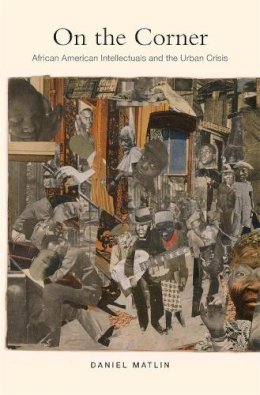
On the Corner: African American Intellectuals and the Urban Crisis
Daniel Matlin
In July 1964, after a decade of intense media focus on civil rights protest in the Jim Crow South, a riot in Harlem abruptly shifted attention to the urban crisis embroiling America's northern cities. On the Corner revisits the volatile moment when African American intellectuals were thrust into the spotlight as indigenous interpreters of black urban life to white America, and examines how three figures--Kenneth B. Clark, Amiri Baraka, and Romare Bearden--wrestled with the opportunities and dilemmas their heightened public statures entailed. Daniel Matlin locates in the 1960s a new dynamic that has continued to shape African American intellectual practice to the present day, as black urban communities became the chief objects of black intellectuals' perceived social obligations.
Black scholars and artists offered sharply contrasting representations of black urban life and vied to establish their authority as indigenous interpreters. As a psychologist, Clark placed his faith in the ability of the social sciences to diagnose the damage caused by racism and poverty. Baraka sought to channel black fury and violence into essays, poems, and plays. Meanwhile, Bearden wished his collages to contest portrayals of black urban life as dominated by misery, anger, and dysfunction.
In time, each of these figures concluded that their role as interpreters for white America placed dangerous constraints on black intellectual practice. The condition of entry into the public sphere for African American intellectuals in the post-civil rights era has been confinement to what Clark called "the topic that is reserved for blacks."
Product Details
About Daniel Matlin
Reviews for On the Corner: African American Intellectuals and the Urban Crisis
Martha Biondi, author of The Black Revolution on Campus On the Corner offers a fresh and bold interpretation of black intellectual life in the 1960s. By taking familiar individuals
Kenneth Clark, Amiri Baraka, and Romare Bearden
and casting them in new light, Matlin advances our understanding of how deeply intertwined conversations about race, identity, authenticity, the establishment, the grassroots, uplift, and masculinity happen to be.
Jonathan Scott Holloway, author of Confronting the Veil: Abram Harris Jr., E. Franklin Frazier, and Ralph Bunche, 1919-1941 Drawing fresh and brilliant insight from the careers of Kenneth Clark, Amiri Baraka, and Romare Bearden, Matlin unpacks the tangled debates over poverty and criminality from a half-century ago with the keenness of a sharp-eyed observer listening on the corner in real time. His observations about the imaginative power of the arts to capture the full dimensions of black humanity
its joy and pain, sorrow and celebration
show just how important the humanities are in illuminating some of our most enduring social challenges.
Khalil Gibran Muhammad, author of The Condemnation of Blackness: Race, Crime, and the Making of Modern Urban America In this fascinating account of how black intellectuals and artists found themselves acting as indigenous interpreters of black life and culture to white America, Matlin examines the roles of Kenneth Clark, Amiri Baraka, and Romare Bearden from this perspective.
W. Glasker
Choice
